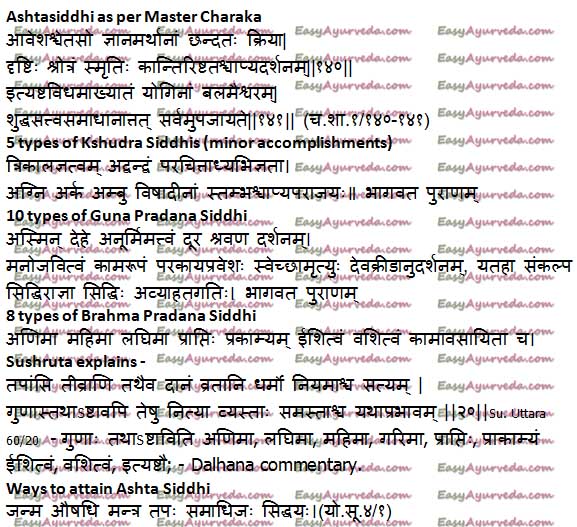Article by Dr Raghuram Y.S. MD (Ay) & Dr Manasa, B.A.M.S
In Hanuman Chalisa – compilation of 40 divine hymns to worship Lord Hanuman , a verse describes Hanuman as ‘Ashta Siddhi Nava Nidhi Ke Daata’ which suggests Lord Hanuman is the granter of 8 super-powers and 9 divine treasures to those that worship him with dedication. In Hindu mythology, other than Lord Ganesha, Lord Hanuman is claimed to adorn Ashta Siddhis and 9 treasures.
Which means, definition of Siddhi
Meanings of Siddhi
Siddhi, a Sanskrit time period means
Accomplishments
Attainments
Success
Perfection
Definition (Wikipedia) – Siddhis are non secular, paranormal, supernatural, magical powers, talents and attainments which can be the merchandise of non secular developments by means of Sadhanas akin to Yoga and Meditation. (Rddhi = psychic powers in Buddhism)

Ashta Siddhis
Ashta Siddhis as defined in Ayurveda
In Ayurveda too, Acharya Charaka has talked about Ashta Siddhis which will be achieved by common apply of Yoga.
Acharya Charaka tells that the Yogi attains 8 siddhis when he practices Yoga by means of the affiliation of his shuddha satva (pure thoughts, devoid of raja and tama – which contaminate thoughts) and soul. 8 siddhis will be achieved solely by those that apply Yoga by associating their pure thoughts with soul.
The Ashta Siddhis are
Aavesha – capacity to enter into the opposite particular person’s physique
Chetaso jnaanam – thoughts studying
Arthaanaam chandatah kriyaa – capacity to regulate one’s sense objects in accordance with will (notion of sense objects i.e. imaginative and prescient, sound, contact, style and scent at will, as and when wanted)
Drushtihi – capacity to see the objects that are in any other case not perceivable by the eyes
Shrotram – capacity to listen to sounds even made at lengthy distances and in any other case not audible
Smrutih – extraordinary reminiscence
Kanti – extraordinary luster
Ishtatah adarshanam – capacity to develop into invisible and visual at will
The Different Siddhis
We will discover many kinds of Siddhis defined at varied situations.
Yogis settle for 23 kinds of Siddhis defined at varied Indian scriptures. They could be briefly summed up as –
5 Kshudra Siddhis
5 kinds of Kshudra Siddhis (minor attainments) – From Bhagavata Purana
Trikalajnatvam – a exact data of three time durations i.e. previous, current and future
Advandvam – having good tolerance in direction of excessive dualities like cold and hot and so on
Para chitta adi abhijnata – thoughts studying
Agni arka ambu visha aadeenaam pratistambhah – tolerating the results of fireplace, warmth of the Solar, water, poisons and so on on self
Aparajayah – remaining undefeated by enemies
10 Guna Pradhana Siddhi
10 kinds of Guna Pradhana Siddhi (secondary attainments based mostly on the predominant acquired high quality) – From Bhagavata Purana
Anurmimattvam – Being undisturbed and unperturbed by bodily wishes and needs like thirst, starvation and so on
Doora Shravana – Skill to listen to sounds coming from far-off, which can’t be perceived by regular ears
Doora Darshanam – Skill to see the issues that are positioned far-off, from the attain of imaginative and prescient (regular visible subject),which can’t be seen by regular eyes
Manojavah – Skill to journey to anyplace wherever the thought goes (astral projection, teleportation)
Kaama Roopam – Skill to imagine any kind desired
Parakaya Pravesham – Skill to enter the physique / our bodies of different folks
Svachanda Mrutyuh – Skill to die when one wishes
Devanam saha krida anudarshanam – Witnessing and taking part with the Gods of their sports activities, video games, leisure actions and different pastimes
Yatha Sankalpa Samsiddhih – Skill to perform ones’ determinations, aspirations to perfection
Ajna apratihata gatih – Orders being unimpeded
8 Brahma Pradana Siddhi
8 kinds of Brahma Pradana Siddhi (Divine attainments, classical accomplishments)
Anima – Skill to cut back one’s personal physique to the minutest measurement and form
Mahima – Skill to broaden one’s personal physique to an infinitely massive measurement
Garima – Skill to develop into infinitely heavy (develop heaviness to excessive ranges within the physique such that one can’t be moved). God Sri Rama bestowed this Siddhi on God Hanuman.
Laghima – Skill to develop into weightless (being gentle, capable of float and fly). God Sri Rama bestowed this Siddhi on God Hanuman.
Prapti – Skill to be anyplace else at one’s will
Prakamya – Skill to acquire no matter one wishes to have
Ishatva – Skill to have supremacy over the character, capacity to regulate and command nature
Vashitva – Skill to regulate one other particular person, to make the particular person do issues as per your want.
As per Samkhya Karika
Ashta Siddhis defined in Samkhya Karika
The eight Siddhis defined by Acharya Kapila within the Tattvasamasa are as defined in Samkhya Karika. They’re as follows –
Uuha – The attainment of data concerning the 24 tattvas (entities concerned in creation of the universe) gained by inspecting the prakriti and vikriti (determinable and the indeterminable aware and the non-conscious constituents of creation), based mostly on the samskaras of purva janma (qualities imbibed by the soul within the earlier incarnation)
Shabda – Information gained by associating self with an enlightened and discovered particular person (Guru)
Addhyayan – Information gained by means of research of the Vedas and different normal treatises
Suhrt Prapti – Information gained from good and type hearted buddies (discussions, share of data)
Daana – Information gained no matter one’s personal wants, passive acquire of data (whereas being within the firm of these looking for the data or whereas attending to the necessities of these engaged within the search of final reality)
Aadhyaatmika Dukha-haan – Freedom from ache, disappointment and so on which will come up attributable to lack of non secular, metaphysical and mystic data and expertise
Aadibhautik Dukkha-haan – Freedom from ache, disappointment, grief and so on arising from being hooked up to or possessive concerning the materialistic good points and worldly pleasures
Aadidaivik Dukkha-haan – Freedom from grief, ache, disappointments and so on attributable to destiny (ill-fate) or reliance on destiny.
With the attainment of 8 Siddhis, one turns into freed from the ache of ignorance, one good points data and experiences final bliss. This may even pave the pathway for salvation.
Reference in Sikhism
Point out resembling Ashta Siddhi in Sikhism
In Sikhism, Siddhi means ‘perception’.
In keeping with Sikh Gurus, the Ashta Siddhis or 8 types of perception is used for the perception of the 8 qualities of Nirankar (the formless or God) talked about within the Guru Granth Sahib, the non secular scripture of Sikhism.
In keeping with these scripts, God has eight qualities i.e.
Ek Oankar (Omkar) – There is just one God
Sat Naam – His identify is true
Karta Purakh – He’s the creator
Nirbhao – With out concern
Nirvair – With out Hate
Akaal Murat – Omnipresent
Ajooni – Free from start and dying
Svaibhang (Saibhan) – Self-Illuminating
The verse comprising of the above talked about siddhis is named Mula Mantar
The one who has the perception of those qualities will likely be known as and regarded as Sidh or Gurumukhi (the attained or the completed)
Methods to achieve Ashta Siddhi
Acharya Patanjali in his Yoga Sutra treatise mentions the methods (strategies) of achieving the supernatural powers i.e. siddhis. Beneath talked about are the methods of achieving Siddhi as per Patanjali –
Janma (by start) – The youngsters who’re born to these mother and father who’re spiritually excessive obtain the powers of spirituality by means of start owing to the womb they’re born in and likewise as part of genetic trait (predisposition). Alternatively it may be stated that some folks, by start might have extraordinary powers to achieve siddhi due to their attainments of their earlier lives.
Aushadhi (drugs, herbs, medication) – Miraculous and particular powers (siddhi) will be attained by consuming some herbs and medicines.
Mantra (incantations) – Particular powers will be attained by recitation (incantation) of mantras (sacred hymns that are highly effective by nature). Such Mantras are present in Vedas.
Tapah (penance, self self-discipline) – The clouds of ignorance within the thoughts are warded off by following penance and self-discipline. With this, one will be capable of management the 5 parts of nature as and when he needs to do. It’s potential by un-perverted considering. It will assist in attaining siddhi.
Samadhi (oneness with consciousness) – One is granted with extraordinary siddhi when he achieves oneness with consciousness.
Click on to Seek the advice of Dr Raghuram Y.S. MD (Ayu) – E mail / Skype




